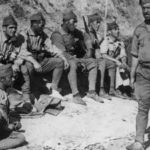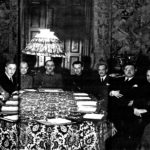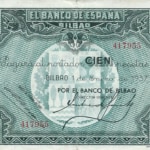Brief history of BBVA (IX): How banks survived the Civil War
With Spain’s banking industry divided in two, and some of the banks’ CEOs and directors going over to the enemy, it was the professionals at the savings banks and banks who made it possible for everyday life to be as normal as possible within the confines of such a harsh war. To the extent possible, executives and workers came up with ways to get by.

There were similarities between both sides of the conflict. Numerous incidents in both the Nationalists and the Republicans took place over who would control war operations. Although the banking industry was not the only industry in which Madrid and Burgos tried to stick their nose, the importance of the banks and savings banks meant they were subjected to extra surveillance and interventions.
Despite constant interference from both sides, the bank workers did a great job remaining professional. Their professionalism saved the sector from the fate of many aspects of finance. In addition to continuing with their regular work in the banking business, directors and their workers had the extra task of ensuring security due to the war.
This included monitoring fronts approaching the bank offices as well as making hidden copies of bank documents that reflected the financial status in case assets were suddenly lost and accounting books fell into enemy hands.
Inevitably, many people died in the bloody civil war, including bank employees. Banks and savings banks could only partially remedy the problem. Vacant positions of most employees could sometimes be filled with workers from outside the bank. The challenge was funding replacements for deceased directors, as there were hardly any professionals available with the required training to take on the management duties.
The vacancies were not just caused by war casualties. Purges also took place on both sides of the war. Franco’s Nationalists changed part of banks’ staff as they conquered enemy territory. The criterion for the purges was none other than removing anyone suspected to be against them. Similarly, Republican company committees, given their power, got rid of employees that were presumptively enemies of the Second Republic.

Franco’s first government in Burgos, 1938
The banks and savings banks’ boards and management resolved the numerous workforce problems caused by both casualties and purges. The directors’ management efforts resulted in practically all the branches and offices remaining in both the rebel and loyalist territory.
Nevertheless, the bank professionals did an excellent job throughout the war, regularly putting the needs of the bank where they worked over their personal or ideological interests. So much so that in many cases it was not complicated to reunite the two entities in which most banks had split after the war. The directors in the Republican area made an effort to continue with business as usual despite the increasingly evident advance of the Nationalists. Protecting each institution’s financial and administrative rules was critical for those in charge of the banks in the losing side’s territory. There were also abuses and brutality, but not on a regular basis. Thanks to strict compliance to the rules and the ingenuity of those in charge of the banks to make copies of the documentation and keep it in a safe place, banking business was able to restart very quickly in Spain, already united by the rebels in 1939.

100 peseta bill issued by in Bilbao by the Banco de Bilbao in 1937
Within the calamity that came from Spain being divided in a civil war, the banks were able to communicate with the different offices they had throughout the country. The fact that so many directors and CEOs relocated, and the sense of a united company that existed among the senior management on both sides of the conflict enabled significant communication between the parties. This is how the Burgos government found out that Madrid was taking the Moscow Gold out of the Bank of Spain, for example. In fact, on October 14, 1936, Franco protested over what he considered “the Madrid government engaging in unprecedented pillaging from a Mediterranean population of the stocks remaining in the Bank (of Spain).”
There were not just leaks that revealed secrets. There were also planned communications that were discovered when people were intercepted acting as unofficial post office workers. They crossed the lines of both sides in order to give information to the head of a bank branch on one side regarding the financial status of a branch in enemy territory for the good of the company. Even the Basque government offered to transmit information to banks under its influence after it moved to Southern France after the fall of Bilbao. After all, given the possibility of the end of the war approaching, those involved wanted the bank statements and bank assets to be as accurate as possible when things finally went back to normal.